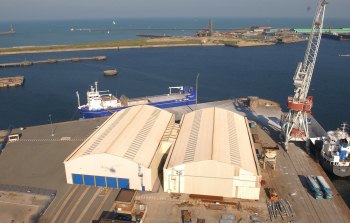The decision has been taken to close down a Dunkirk terminal formerly used in the transit of nuclear fuel between the UK and continental Europe.
 |
| The Atlantic Osprey docks at the INS terminal at Dunkirk (Image: INS) |
The terminal at the port of Dunkirk near the Belgian border in northern France had been maintained since 1979 by the former British Nuclear Fuels Ltd (BNFL) and its transport division, now a wholly owned subsidiary of the Nuclear Decommissioning Authority known as International Nuclear Services (INS). From that time until 2005 it was used as a transit point for shipment of used nuclear fuel from nuclear power plants in Germany, Switzerland and Italy en route to Sellafield for reprocessing.
"It was expected that the terminal would be used for the shipments of vitrified residues from Sellafield to their country of origin in continental Europe from 2008-9 onwards," Paul Harding of INS France told World Nuclear News, "INS France is still representing INS interests in France and supporting our European customers but the rescheduling of these transports into 2013 at the earliest has left us no other economically viable solution than to close the Dunkirk terminal at the end of the site lease on 3 September this year."
INS is currently carrying out the return of vitrified radioactive waste left over from reprocessing of used nuclear fuel. The first shipment left Barrow-in-Furness on 20 January, arriving in Rokkasho, Japan on 9 March. Four days later the second shipment left for the Dutch port of Vlissengen, for transfer to the nearby Habog storage facility.
Over ten years some 1850 canisters of vitrified wastes are to be returned to the overseas reprocessing customers of the UK's state-owned Thermal Oxide Reprocessing Plant (Thorp).
Researched and written
by World Nuclear News




_47120.jpg)

_23621.jpg)






